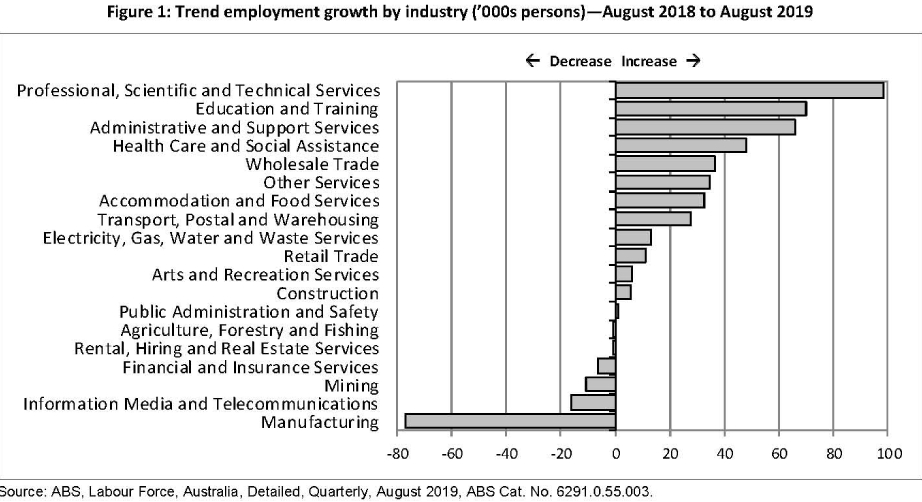
Australia is one of the most sought-after destinations for skilled immigrants looking at lucrative jobs opportunities overseas. If you are thinking of moving to Australia as a skilled foreign worker somewhere in the near future, knowing as to which occupations are in demand in Australia in 2020 can help you in taking the call, so to speak.
A good standard of living, impressive employment potential, great locales, and a generally laid-back attitude to life at large – there is indeed much that Australia has to offer to attract people from all over the world.
The Australian government’s Department of Employment, Skills, Small and Family Business produces a quarterly publication – the Australian Labour Market Update – that assists in gaining an understanding of the labour market for all those, especially migrants, that are seeking jobs in Australia.
As per the Australian Labour Market Update published October 2019, within the year leading to August 2019, area-wise the strongest employment growth in terms of perceivable trends were reported in –
| Strongest employment growth in the 12 months to August 2019 | |
| Victoria | 3.2% |
| New South Wales (NSW) | 2.9% |
| Australian Capital Territory (ACT) | 2.6% |
Growth and employment opportunities varied from industry to industry.
Industry-wise employment trend stood at –

As per the Australian government’s Labour Market Information Portal, “Employment is projected to increase in 16 of the 19 broad industries over the five years to May 2024.”
Interestingly, 4 industries are projected to be responsible for over 3/5th or about 62.1% of the total employment growth in Australia in the 5 years leading to May 2024.
As per the Labour Market Information Portal, Health Care and Social Assistance is believed to register the highest employment growth.
Employment growth estimated over the 5 years to May 2024 in these 4 main industries is –
| Industry | Increase by |
| Health Care and Social Assistance | 252,600 |
| Professional, Scientific and Technical Services | 172,400 |
| Education and Training | 129,300 |
| Construction | 113,700 |
Every year, the Department of Employment, Skills, Small and Family Business produces employment projections for the following 5-year period.
Based on the “Occupation Ceilings” on the occupation groups for the 2019-20 program year, the occupations in demand in Australia in 2020 can be said to be the following –
| Australian and New Zealand Standard Classification of Occupations (ANZSCO) Code | Description | Occupational Ceiling 2019-20 |
| 2544 | Registered Nurses | 17,509 |
| 2613 | Software and Applications Programmers | 8,748 |
| 3411 | Electricians | 8,624 |
| 3312 | Carpenters and Joiners | 8,536 |
| 2414 | Secondary School Teachers | 8,052 |
| 3232 | Metal Fitters and Machinists | 7,007 |
| 3212 | Motor Mechanics | 6,399 |
| 1213 | Livestock Farmers | 5,934 |
| 2247 | Management consultant | 5,269 |
| 3341 | Plumbers | 5,060 |
| 1331 | Construction Managers | 4,983 |
| 2713 | Solicitors | 4,650 |
| 4523 | Sports Coaches, Instructors and Officials | 4,071 |
| 3223 | Structural Steel and Welding Trades Workers | 3,983 |
| 2332 | Civil Engineering Professionals | 3,772 |
| 2531 | General Practitioners and Resident Medical officers | 3,550 |
| 2421 | University Lecturers and Tutors | 3,407 |
| 3322 | Painting Trades Workers | 3,330 |
| 1399 | Other Specialist Managers | 3,044 |
| 2621 | Database and Systems Administrators and ICT Security Specialists | 2,887 |
| 2211 | Accountants | 2,746 |
| 3513 | Chefs | 2,738 |
| 2611 | ICT Business and Systems Analysts | 2,587 |
| 2631 | Computer Network Professionals | 2,553 |
| 2411 | Early Childhood (Pre-primary School) Teachers | 2,294 |
| 2321 | Architects and Landscape Architects | 2,171 |
| 2725 | Social Workers | 2,128 |
| 3941 | Cabinetmakers | 2,112 |
| 3332 | Plasterers | 2,100 |
| 3421 | Airconditioning and Refrigeration Mechanics | 1,851 |
| 2723 | Psychologists | 1,832 |
| 1342 | Health and Welfare Services Managers | 1,785 |
| 2525 | Physiotherapists | 1,784 |
| 3334 | Wall and Floor Tilers | 1,682 |
| 3311 | Bricklayers and Stonemasons | 1,610 |
| 2335 | Industrial, Mechanical and Production Engineers | 1,600 |
| 2212 | Auditors, Company Secretaries and Corporate Treasurers | 1,552 |
| 2346 | Medical Laboratory Scientists | 1,505 |
| 2343 | Environmental Scientists | 1,472 |
| 3423 | Electronics Trades Workers | 1,313 |
| 2539 | Other Medical Practitioners | 1,250 |
| 2541 | Midwives | 1,218 |
| 2512 | Medical Imaging Professionals | 1,203 |
| 2415 | Special Education Teachers | 1,111 |
| 2121 | Artistic Directors, and Media Producers and Presenters | 1,098 |
| 2524 | Occupational Therapists | 1,082 |
| 3611 | Animal Attendants and Trainers | 1,051 |
| 1332 | Engineering Managers | 1,000 |
| 1341 | Child Care Centre Managers | 1,000 |
| 2111 | Actors, Dancers and Other Entertainers | 1,000 |
| 2112 | Music Professionals | 1,000 |
| 2241 | Actuaries, Mathematicians and Statisticians | 1,000 |
| 2243 | Economists | 1,000 |
| 2245 | Land Economists and Valuers | 1,000 |
| 2322 | Cartographers and Surveyors | 1,000 |
| 2331 | Chemical and Materials Engineers | 1,000 |
| 2333 | Electrical Engineers | 1,000 |
| 2334 | Electronics Engineers | 1,000 |
| 2336 | Mining Engineers | 1,000 |
| 2339 | Other Engineering Professionals | 1,000 |
| 2341 | Agricultural and Forestry Scientists | 1,000 |
| 2342 | Chemists, and Food and Wine Scientists | 1,000 |
| 2344 | Geologists, Geophysicists and Hydrogeologists | 1,000 |
| 2345 | Life Scientists | 1,000 |
| 2347 | Veterinarians | 1,000 |
| 2349 | Other Natural and Physical Science Professionals | 1,000 |
| 2514 | Optometrists and Orthoptists | 1,000 |
| 2519 | Other Health Diagnostic and Promotion Professionals | 1,000 |
| 2521 | Chiropractors and Osteopaths | 1,000 |
| 2526 | Podiatrists | 1,000 |
| 2527 | Speech Professionals and Audiologists | 1,000 |
| 2533 | Internal Medicine Specialists | 1,000 |
| 2534 | Psychiatrists | 1,000 |
| 2535 | Surgeons | 1,000 |
| 2612 | Multimedia Specialists and Web Developers | 1,000 |
| 2633 | Telecommunications Engineering Professionals | 1,000 |
| 2711 | Barristers | 1,000 |
| 3122 | Civil Engineering Draftspersons and Technicians | 1,000 |
| 3123 | Electrical Engineering Draftspersons and Technicians | 1,000 |
| 3132 | Telecommunications Technical Specialists | 1,000 |
| 3211 | Automotive Electricians | 1,000 |
| 3222 | Sheetmetal Trades Workers | 1,000 |
| 3233 | Precision Metal Trades Workers | 1,000 |
| 3241 | Panelbeaters | 1,000 |
| 3331 | Glaziers | 1,000 |
| 3422 | Electrical Distribution Trades Workers | 1,000 |
| 3991 | Boat Builders and Shipwrights | 1,000 |
| 4524 | Sportspersons | 1,000 |
By an “occupational ceiling” is meant a limit on the total number of Expression of Interests (EOIs) that can be selected for skilled migration from any particular occupation group.
Once the occupation limit is reached for any specific occupation, no further invitations will be received for the same for that program year.
In such a scenario of the occupation ceiling being reached, invitations will then be alternatively issued to those interested in migrating to Australia from other occupations groups even if they have a low ranking on the score calculator.
From the above-mentioned table it can be seen that for the 2019-20 program year, the maximum number of places have been allocated to Registered Nurses, followed by Software and Applications Programmers, and Electricians.
If you are seriously considering settling down in Australia, there is no better time to apply than now!
Begin your Australia PR journey by getting your score from our Australia Skilled Immigration Points Calculator.
For further details, click here.
——————————————————————————————————————
Also read:
- How many points are required for Australia PR in 2020?
- What is the easiest way to get Australia PR in 2020?
- How to apply for Australia PR from India in 2020?
- What are the eligibility requirements for Australia PR in 2020?
- What is the Australia PR process timeline in 2020?
——————————————————————————————————————
If you are looking to Study, Work, Visit, Invest or Migrate Overseas, talk to Y-Axis, the World’s No. 1 Immigration & Visa Company.
If you found this blog engaging, you may also like…



Which occupations are in demand in Australia in 2020?
Posted on December 17, 2019